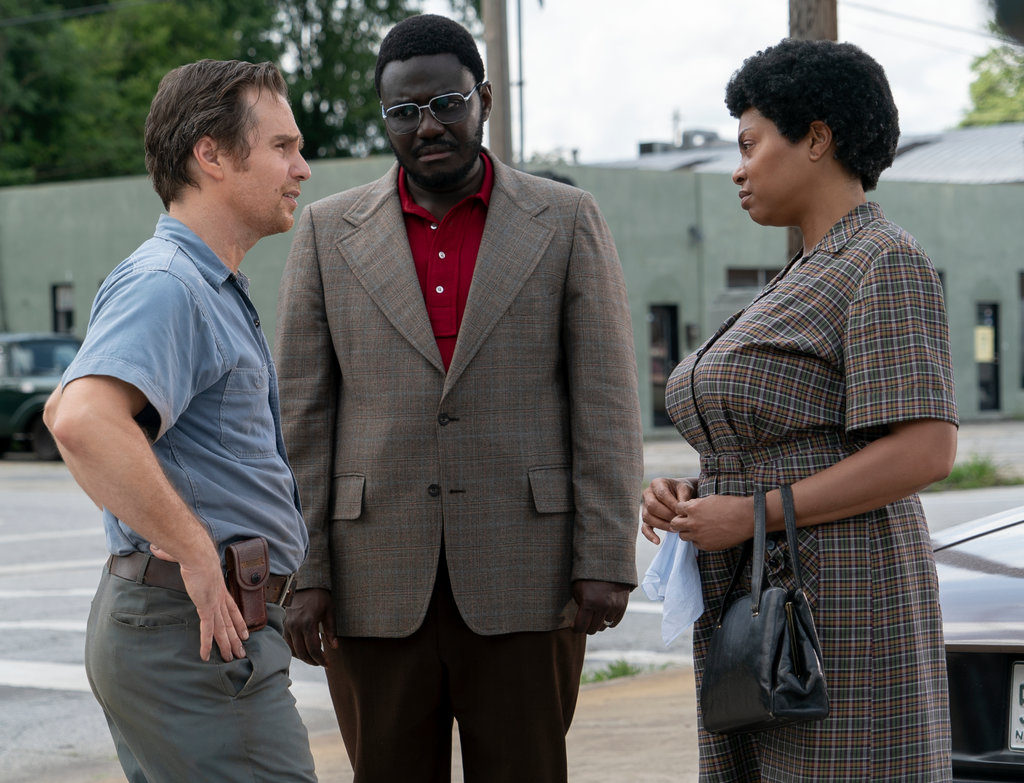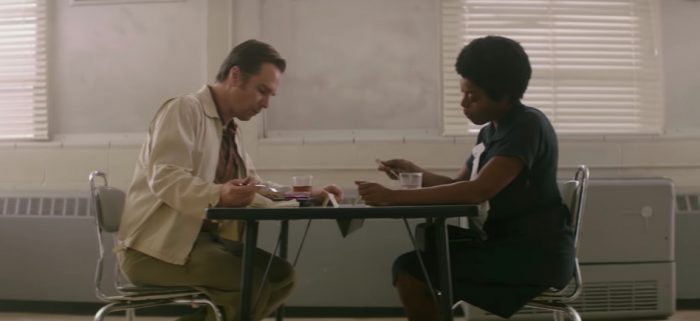The Best of Enemies (2019)

DIRECTOR: Robin Bissell
CAST: Sam Rockwell, Taraji P. Henson, Babou Ceesay, Anne Heche, Wes Bentley, Bruce McGill
REVIEW:
Quick on the heels of recent Best Picture winner Green Book comes yet another one of those standard-issue, well-intentioned 1960s “based on a true story” race relations dramas that are all the rage these days. Given the current political climate, a movie about a die-hard racist and an equally aggressive black activist getting past their enmity isn’t necessarily a bad thing, but even more so than Green Book (an enjoyable, inoffensive little movie which was not, in my opinion, Oscar material), The Best of Enemies is standard issue and a little trite and does nothing to distinguish itself from all the other movies covering similar subject matter in recent years. It’s easily lumped in with the likes of The Help, Hidden Figures (also starring Taraji P. Henson), and Green Book, and doesn’t linger in the memory.
We open in 1971 Durham, North Carolina, holding out as a last bastion of school segregation, which is challenged by sheer necessity when the black school burns down. When nobody can agree on what to do with the displaced schoolkids, local politicians try to pass the controversial buck by bringing in an outsider, black community organizer Bill Riddick (Babou Ceesay), who proposes a charrette, a community town hall where chosen representatives from among the attending crowd will vote on various proposals, including but not limited to school integration, to be adopted by the city council. In an effort to bridge the divide on the sharply-contested issue, Riddick brings together two diametrically opposed individuals as co-chairs. One is Ann Atwater (Taraji P. Henson), an in-your-face black activist whose community organizing and rabble-rousing has given her a leader status among the local African-American community. The other is Claiborne Paul “C.P.” Ellis (Sam Rockwell), the president of the local chapter of the Ku Klux Klan. C.P. and Ann are both incredulous at the idea of Riddick choosing them to work together, and in fact the only thing they agree on is that neither of them wants any part of this. They’re both grudgingly brought onboard by a little savvy political maneuvering, by Riddick in Ann’s case, and C.P. reluctantly agreeing when local politicians led by the city council president (Bruce McGill) persuade him that working from the inside will place him in a strategic position to make sure school segregation is preserved. At first, relations are about as testy as would be expected, but eventually C.P. finds his white supremacist convictions wavering, to the disapproval of some of his own Klan lieutenants.

The Best of Enemies at least doesn’t send C.P. and Ann straight from butting heads to joining hands in a civil rights march. These two do not like each other, and remain mutually hostile for most of the movie. When the shrewdly diplomatic Riddick assigns everyone seats for lunch, and none-too-coincidentally pairs Ann and C.P. at the same table, they can barely make the smallest of chit chat. Eventually, Ann attempts a peace overture of sorts by using her influence to pull some strings and get better treatment for C.P.’s mentally handicapped son who lives in a local hospital, but C.P. does not react well to being in Ann’s debt; this is in contrast to the gratitude shown by C.P.’s wife (Anne Heche), who visits Ann and strikes up a tentative fledgling friendship, which doesn’t sit well with some of C.P.’s fellow Klansmen. When Ann insists on gospel music to close out each gathering, C.P. (who dismisses gospel as “nigger music”) concedes but demands the quid pro quo of being allowed to display Klan paraphernalia, including a cloak and hood mounted in the hallway, to ensure both sides are represented. This leads to a moment in which Ann catches black youths trashing the Klan display stand and takes the surprising step of swallowing her own outrage and straightening the Klan costume herself to preserve the fragile peace. C.P. witnessing this, and a later moment in which he is troubled by the fear with which Ann’s young daughter regards him, are small steps along his gradual road to abandoning his own racist convictions (“she looked at me like I was some kinda monster”, he confides to his wife, who dryly asks what he expected).
There’s also behind-the-scenes maneuvering and strong-arming. A sympathetic, pro-integration white woman among the elected representatives receives a threatening home visit by some Klansmen who intimidate into changing her stance. And when C.P.’s city council allies pull some strings to shut down the business of a black-friendly Vietnam veteran (John Gallagher Jr.) whose military service C.P. respects, C.P. finds himself morally conflicted about the actions of men he views as friends and comrades. And when C.P. himself eventually turns his back on the Klan, he finds out what it’s like to be on the receiving end of harassment, when his gas pump is sabotaged and his gas station is boycotted (his former nemesis Ann is his unlikely savior, using her community organizing skills and local influence to send a long line of cars his way, driven by the same black customers he once refused to serve).
Like Green Book (which was told primarily from the perspective of Viggo Mortensen’s Tony Vallelonga), The Best of Enemies is in for some surefire criticism that it gives more character development to the white protagonist than to the black one. We get bits of both C.P. and Ann at home with their children (initially, C.P.’s concern for his mentally handicapped son is his lone halfway sympathetic quality), but not enough is done to make Ann a fully fleshed-out individual rather than serving primarily as C.P.’s foil. At least it’s not afraid to be warts-and-all in both portrayal. While we tend to side with Ann on principle, she’s not the most likable personality; she’s a crusading social justice warrior, mad as hell and not going to take it anymore, whose first instinct is to lash out at anyone and anything standing in her way, to an abrasive extent (the diplomatic Riddick stands as a black counter-example, believing they’ll get farther through engaging in dialogue, even with people Ann finds as repugnant as C.P.). For Ann, there’s a little softening toward C.P., but not much character arc. She’s basically the same at the end as the beginning, to an extent that verges on one-note (more a criticism of the writing and limited character development than Taraji P. Henson’s performance). More time is spent on C.P.’s character arc, but it feels insufficiently developed. Just as the movie doesn’t try to make Ann more likable than she is, it also doesn’t paint C.P. with horns. He’s hardly the most sympathetic individual—-one of his first scenes is he and some of his henchmen shooting up the house of a white woman suspected of having a black boyfriend—but the movie makes it clear his membership in the Klan was primarily motivated by a sense of belonging and camaraderie, and that he’s uneducated and ignorant more than “evil”. When his big climactic speech comes (in which he shocks onlookers both black and white by renouncing his membership in the Klan and voting in favor of integration), Sam Rockwell’s performance is almost good enough to make us buy the moment, but the writing doesn’t feel like it’s done enough to get us to this point. By the end, there’s a little mutual softening between C.P. and Ann, but we don’t feel like anything more than the most tentative beginnings of what might be called a “friendship” has been formed (in fact, C.P. and Ann feel like they’re suddenly a little too friendly in the epilogue , like there’s something missing in between). When the closing captions relate their subsequent decades-long friendship (they toured together speaking of their experience, and Atwater delivered the eulogy at Ellis’ funeral in 2005), it feels like we’re being told something the movie never really showed us. Considering it’s ostensibly the central focus of the movie (though sometimes it doesn’t feel like it), the enmity turned friendship between C.P. and Ann feels oddly underdeveloped and lacking in depth.
The acting is a notch above adequate but a notch below Oscar-worthy, even led by awards darlings Sam Rockwell and Taraji P. Henson. Rockwell hasn’t strayed far from his previous Oscar-winning role in Three Billboards Outside Ebbing Missouri, in which he played a racist cop on a redemptive arc. More transformative is a thoroughly de-glamorized Henson, wearing little or no makeup and sporting an afro, a bowlegged walk, and low-slung bosoms, who makes Ann a forceful presence. Supporting roles include Babou Ceesay as the more diplomatic Riddick, who does his best to play mediator between Ann and C.P. (not always an easy task), Anne Heche as C.P.’s wife who doesn’t share his racist convictions, Wes Bentley as C.P.’s Klan right-hand man who takes a dim view of his boss showing even the slightest softening toward blacks, and Bruce McGill as the sort of behind-the-scenes “big bad” of the city council president who wants C.P. and the Klan to do the dirty work that a public official can’t be seen to be involved with.
At the bottom line, The Best of Enemies is just another one of the trite, standard-issue, earnestly-intentioned 1960s race relations dramas that Hollywood is churning out these days almost as eagerly as remakes and superhero movies. It’s technically competent but lacks depth and does nothing to distinguish itself in a crowded field, and its central dynamic feels oddly underdeveloped. It’s no more than a middling entry in an overcrowded genre.
* * 1/2